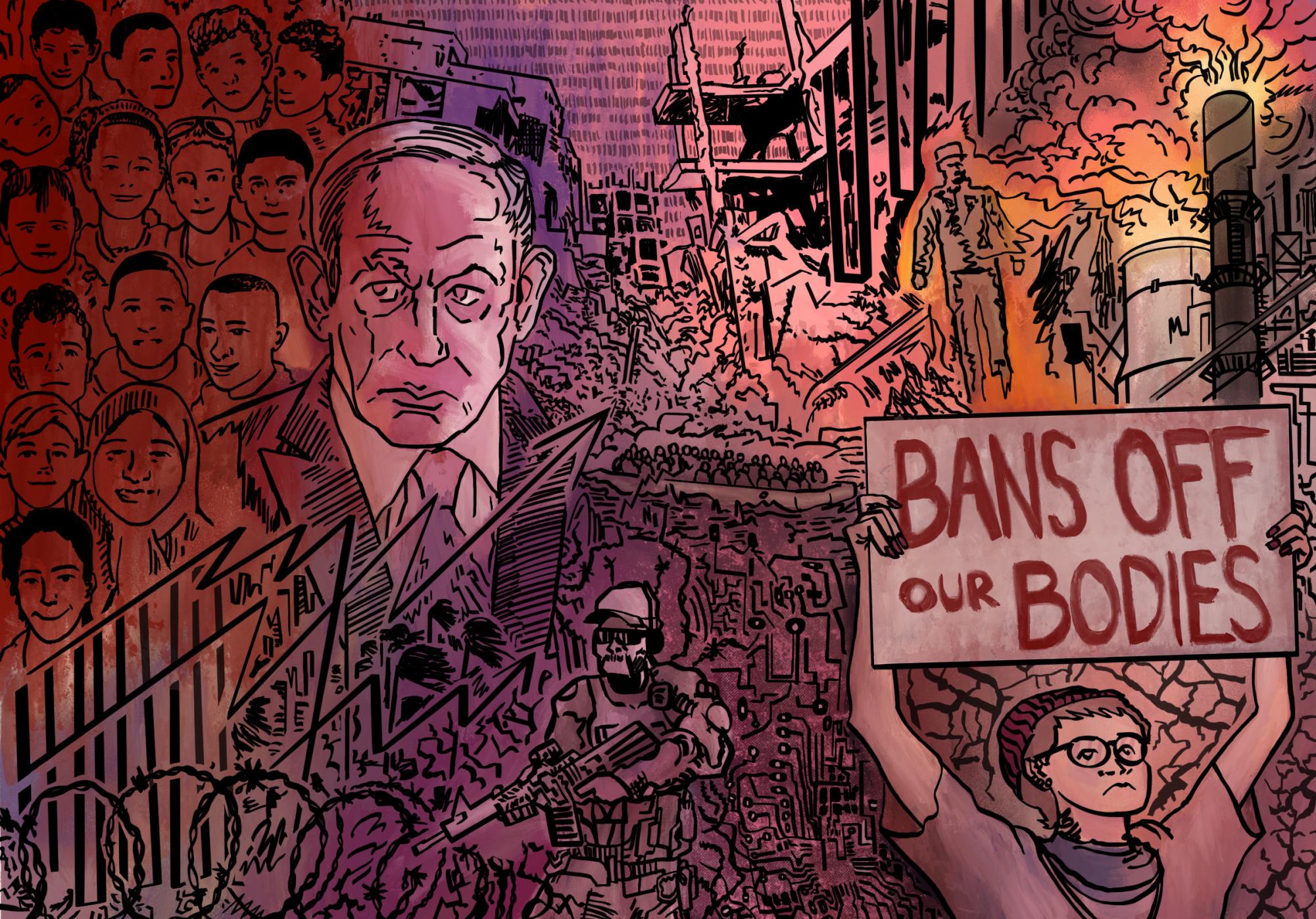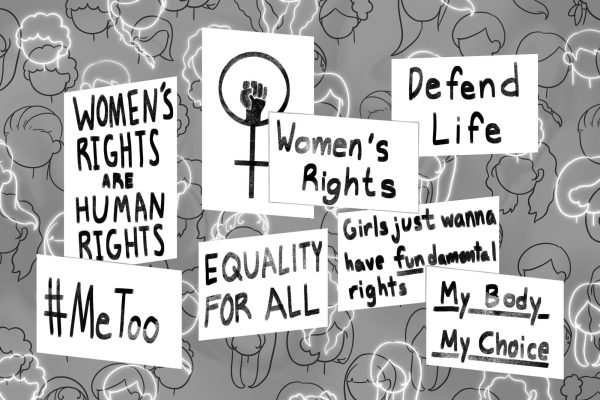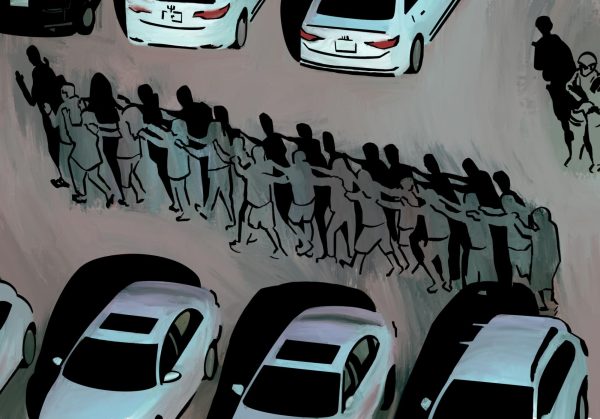Where Trump and Harris stand on 6 key young-voter concerns
Under the Arch
Where Trump and Harris stand on 6 key young-voter concerns
WSN summarizes both candidate’s statements on top issues this upcoming election.
Emily Genova, Karina Rower, Krish Dev and Mehr Kotval | Oct. 28, 2024

This coming presidential election marks the first time many individuals will cast their votes, and with just over a week remaining until ballots are submitted amid a barrage of criticism and commentary, it can be challenging to discern the candidates’ promised actions. WSN has compiled the current public opinions of former President Donald Trump and Vice President Kamala Harris’ on several contentious issues, drawing from statements made in interviews and their campaign platforms.
Abortion
Emily Genova — Deputy Managing Editor

Harris
Harris is pro-choice, and has said she will “never allow a national abortion ban,” promising to sign any bill passed by Congress to reverse the repeal of Roe v. Wade. Abortion has been a significant focus of her campaign, with advertisements highlighting the issue. In August, a Georgia woman died after receiving delayed care for complications from an abortion pill. Due to Georgia’s abortion laws, doctors were forced to wait until her life was at risk to perform the procedure. Harris released an advertisement on this case, framing it as an example of the “Trump abortion ban.” On Sept. 17, Republicans blocked a bill that would protect in vitro fertilization treatments, a type of fertility treatment, nationwide. In response, Harris issued a statement that said the administration will “fight to protect reproductive freedoms, which must include access to IVF.” This bill comes after the Alabama Supreme Court ruled that frozen embryos from this treatment are legally considered children.
Trump
During Trump’s presidential term, he appointed three conservative justices to the Supreme Court — establishing a conservative majority — and referred to their overturning of Roe v. Wade as a “great thing.” He supports enabling states to determine their own abortion laws. Although Trump has denied any knowledge of Project 2025, he has been linked to it. The project states, “In particular, the next conservative President should work with Congress to enact the most robust protections for the unborn that Congress will support while deploying existing federal powers to protect innocent life and vigorously complying with statutory bans on the federal funding of abortion.” While Project 2025 does not explicitly call for a federal abortion ban, Trump said in a post on X that he would not support one. Instead, Project 2025 proposes withdrawing the popular abortion pill mifepristone from the market, and funding alternatives like adoption — ideas the former president appears to agree with. Following the Alabama Supreme Court’s ruling on IVF, Trump expressed his support for the availability of IVF in a statement on Truth Social, writing, “I strongly support the availability of IVF for couples who are trying to have a precious baby.” During a town hall on Oct. 15, Trump called himself the “father of IVF” while addressing an all-female audience in Georgia.
Environment
Karina Rower — Under the Arch Editor

Harris
As part of the economic sector of the Democratic candidate’s platform, the Harris-Walz campaign website highlights the impact of the Inflation Reduction Act over the past two years. Enacted in August 2022, the law aimed to lower energy costs by creating career opportunities in clean energy. If elected, Harris claims she will continue her efforts by “holding polluters accountable, helping communities affected by climate change and protecting natural resources.” Additionally, during the presidential debate on Sept. 10 both candidates addressed climate change, particularly the environmental effects of fracking.“I will not ban fracking,” Harris said during the debate. “I have not banned fracking as vice president of the United States. And, in fact, I was the tie-breaking vote on the Inflation Reduction Act, which opened new leases for fracking.” Despite promising to ban fracking during her 2020 presidential campaign, Harris has since shifted her stance, likely in response to the potential increase in gas prices and to continue her work with the Biden administration. “We have invested a trillion dollars in a clean energy economy, while we have also increased domestic gas production to historic levels,” Harris said in the Sept. 10 debate.
Trump
Throughout his campaign, Trump has consistently highlighted his past actions against clean energy and expressed skepticism about climate change in all his statements. The 2024 GOP Platform emphasizes that under Trump’s time in office, the United States became the world’s leading producer of oil and natural gas. Republicans aim to “unleash energy production from all sources, including nuclear, to immediately slash inflation and power American homes, cars and factories with reliable, abundant and affordable energy.” During the Trump administration, over 125 rules and policies designed to protect the environment were significantly weakened. The rallying cry of “drill, baby, drill,” used by Trump at the Republican National Convention, underscored his commitment to increasing domestic oil and gas production to combat inflation. Trump has consistently endorsed fracking, and during the September presidential debate, he targeted crucial swing state Pennsylvania by pointing out Vice President Harris’ previous stance on the issue. “Fracking. She’s been against it for 12 years,” Trump said. “She will never allow fracking in Pennsylvania. If she wins the election, it will end day one.” Overall, the central focus of Trump’s platform is to dismantle the environmental regulations instituted by Biden’s administration, aiming to end the “war on American energy.”
Gun Control
Mehr Kotval — Opinion Editor

Harris
Harris has made gun control a central focus of her campaign. As vice president, she has led the Biden administration’s initiatives to promote gun safety, advocating for red flag laws that permit the temporary seizure of firearms from individuals considered a danger to themselves or others. Throughout her political career, she has advocated for the reinstatement of the assault weapons ban and restrictions on high-capacity magazines. The Biden-Harris administration also issued an executive action to close the “gun show loophole,” which allows private sellers, such as those at gun shows, to sell firearms without conducting background checks. As a California district attorney, she led the state to become the third to implement its red flag law, which allows individuals to seek gun violence restraining orders. During her time as a senator, she co-sponsored the Disarm Hate Act, a law that prohibits individuals convicted of violent hate crimes from purchasing and possessing firearms. Harris also advocated for closing the “boyfriend loophole” to prevent stalkers from purchasing firearms. More recently, Harris announced the launch of a National Extreme Risk Protection Order Resource Center, which helps state and local governments enact local red flag laws. In her time as vice president, violent crime has reached a 50-year low. If elected president, she pledges to enact universal common sense background checks.
Trump
Trump has supported the National Rifle Association and gun-rights activists, stating, “No one will lay a finger on your firearms” if he is reelected. He has voiced opposition to federal background checks and red flag laws. The former president has vowed to undo any gun restrictions passed under the Biden-Harris administration, saying, “Every single Biden attack on gun owners and manufacturers will be terminated my very first week back in office, perhaps my first day.” During his presidency, Trump maintained a close relationship with the NRA, which endorsed him in both the 2016 and 2020 elections. Despite public pressure to address gun violence after several mass shootings, Trump has largely resisted gun control measures. He has repeatedly argued that mental health issues, rather than access to firearms, are the root cause of mass shootings, telling his supporters that school shootings are something “we have to get over,” while his running mate, JD Vance, referred to these shootings as a “fact of life.”
Immigration
Krish Dev — Director of Creative & Digital Strategy

Harris
Harris includes a section titled “Secure Our Borders and Fix Our Broken Immigration System” in her “New Way Forward” economic plan. In this section, she emphasizes the need for “tough, smart solutions” and reiterates her support for a bipartisan border enforcement bill that stalled in the Senate last May. Promoted during her campaign as “the toughest border control bill in decades,” this legislation aimed to close asylum loopholes and grant the president expanded authority to shut down the border during surges in unauthorized crossings. In September, Harris visited the U.S.-Mexico border to inspect the wall and meet with local officials, criticizing Trump’s efforts by stating that he “did nothing to fix our broken immigration system.” Harris has also drawn from her time as California’s Attorney General, highlighting her experience prosecuting “transnational gangs, drug cartels and human traffickers that came into our country illegally.” Notably, Harris has shifted her stance on deportations since her 2020 presidential run. While she previously argued that crossing the border without authorization should not be criminalized, her campaign now clarifies that she believes “unauthorized border crossings are illegal.” At the Democratic National Convention in August, Harris said that she plans to “reform our broken immigration system” by creating “an earned pathway to citizenship” while also committing to “secure our border.”
Trump
Trump has made immigration a central focus of his campaign, outlining it as a top priority in his “Agenda 47” platform. His first two key promises are to “seal the border and stop the migrant invasion” and “carry out the largest deportation operation in American history” upon his election. During his previous four-year term, the Trump administration deported approximately 1.5 million people — half of the 3 million he initially vowed to deport during his 2016 campaign. This election cycle, Trump has provided more detailed plans, including invoking the Alien Enemies Act and reinstating his Remain in Mexico and Title 42 policies. In an April interview with Time Magazine, he emphasized his intention to use both local law enforcement and the military to address what he described as “an invasion like probably no country has ever seen before.” Trump continues to promote the completion of the U.S.-Mexico border wall, a signature promise from his earlier campaigns. At a July rally, he claimed his administration “created the most secure border in U.S. history” and “built nearly 500 miles of border wall,” though the actual length of new primary barriers constructed was closer to 50 miles — roughly 10% of the distance he had promised. Trump has also said he wants to end automatic citizenship for children born in the U.S. to undocumented immigrants and expand his previous Muslim travel ban. At the Republican National Convention in July, he said that none of his other policy aims can succeed unless “we stop the illegal immigrant invasion.”
Income inequality
Mehr Kotval — Opinion Editor

Harris
A cornerstone of Harris’ agenda is raising the federal minimum wage to $15 per hour, up from $7.25, in order to lift millions out of poverty. Harris also advocates for expanded access to childcare, including a plan that includes a $6000 tax credit to help working parents afford these essential services. Harris has also said she would implement tariffs targeted at industries and geopolitical rivals, including Chinese technology products. Harris plans to expand student debt relief and bolster antitrust initiatives and enforcement. On the individual side, she aims to raise the income tax rate for individuals earning over $400,000 to pre-2018 levels, which could be achieved by letting tax cuts from the 2017 Tax Cuts and Jobs Act expire. She has also proposed a $50,000 tax cut for small business owners. The Wharton School estimated that the increased spending associated with Harris’ proposals could significantly raise the deficit, especially if accompanied by less aggressive tax increases. However, supporters contend that investing in social programs and infrastructure can generate economic growth that benefits everyone, potentially offsetting initial costs.
Trump
Trump’s economic plan focuses on tax cuts, deregulation of economic industries and American manufacturing. The Tax Cuts and Jobs Act of 2017 slashed corporate tax rates from 35% to 21% and provided individual tax reductions. Proponents argue that these cuts stimulated economic growth and job creation, but critics contend they disproportionately benefited the rich, contributing to increased national debt. According to the Congressional Budget Office, the tax cuts are expected to add nearly $1.9 trillion to the deficit over a decade. The Wharton School of Business has projected that the tax cuts would lead to an initial increase in the deficit, as the immediate loss of revenue would not be offset by anticipated economic growth. Trump has proposed a 60% tariff on all goods from China and aims to substantially cut regulations across the board. He plans to reduce barriers and lengthy approval times for mergers and acquisitions, as well as reclassify more civil service workers as political appointees rather than career employees. Trump also seeks to permanently extend the tax rates established in the TCJA, which would require legislative action. Experts say that Trump’s economic plan could significantly increase inflation.
War in Gaza
Mehr Kotval — Opinion Editor

Harris
The Biden-Harris administration has played a significant role in the ongoing war in Gaza. Since Oct. 7, they have sent billions of dollars in military aid along with weapons to Israel. Harris has claimed that she and President Biden are “working around the clock” to get hostage and ceasefire deals done, yet the United States has vetoed several U.N. cease-fire resolutions. While they publicly present themselves as active negotiators striving for peace, their policies and actions have been perceived as overwhelmingly favoring Israel’s military campaign, contributing to the rising death toll in Gaza. Harris says she will always stand for Israel’s “right to defend itself.” At the DNC, Harris said, “The scale of suffering is heartbreaking” in Gaza, and that she and President Biden “are working to end this war such that Israel is secure, the hostages are released, the suffering in Gaza ends, and the Palestinian people can realize their right to dignity, security, freedom and self-determination.” However, when asked if she would handle the situation differently than Biden if elected, she said no.
Trump
Trump has adopted an unyielding pro-Israel stance. He has frequently used the term Palestinian in a derogatory manner, most notably in his debate with Biden when he compared the current president to “a Palestinian” due to his interest in a cease-fire. Following the Oct. 7 attacks, Trump’s support for Israel has intensified, as he actively encourages Israel to “finish the job” in Gaza. Trump has aligned himself with the most hardline elements of right-wing Israeli policy, advocating for the expansion of settlements and opposing a two-state solution. Under Trump, decisions like the recognition of Jerusalem as Israel’s capital, the relocation of the U.S. Embassy there and a spike in Israeli settlements in the West Bank were seen as victories for Israeli Prime Minister Benjamin Netanyahu’s government and the Israeli right. Netanyahu has continuously praised Trump and his administration, saying that he believes Israel will get the support it needs under Trump. During Trump’s presidency, Netanyahu expressed confidence that Israel had a strong ally in the White House, with Trump having simply claimed in speeches that “we love Israel; we will save Israel; and we will fight with Israel.” Trump has called himself Israel’s “protector” and said that Jewish voters have no excuse to vote for Harris.

Emily Genova is a senior studying media, culture, and communication and creative writing. She spends her free time reading, obsessing over pop artists...

Karina Rower is a sophomore studying magazine journalism and computer science at the Gallatin School of Individualized Study. She loves oversharing to...

Krish Dev is a third-year senior studying computer science and linguistics. This is his third semester on WSN’s management team, following his time as...

Allina Xiao is a junior studying computer science at CAS. When she's not switching her third minor again, she can be found enjoying her fourth semester...






















































































































































